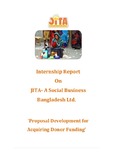| dc.contributor.advisor | Akhter, Rahma | |
| dc.contributor.author | Mahin, Kazi Tamanna | |
| dc.date.accessioned | 2016-05-22T15:16:16Z | |
| dc.date.available | 2016-05-22T15:16:16Z | |
| dc.date.copyright | 2016 | |
| dc.date.issued | 2016-05-16 | |
| dc.identifier.other | ID 11104136 | |
| dc.identifier.uri | http://hdl.handle.net/10361/5310 | |
| dc.description | This internship report is submitted in a partial fulfillment of the requirements for the degree of Bachelor of Business Administration, 2016. | en_US |
| dc.description | Cataloged from PDF version of Internship report. | |
| dc.description | Includes bibliographical references (page 38). | |
| dc.description.abstract | Till date, 3 billion people in the developing world still use the traditional cookstove and it is causing 4 million premature deaths annually. The traditional cookstoves impose a life risk among its users, specially women and children. However, the billions of people using the traditional cookstove are not aware of the harm it is causing. Extensive studies have shown that the Bottom of the Pyramid (BoP) consumers cannot be persuaded by highlighting the health risks arising due to the use of traditional cookstoves. The lack of customer demand can be attributed to product gaps, ineffective marketing, high prices, and limited distribution networks. Therefore, Global Alliance for Clean Cookstoves (GACC), has created a platform to bring all stakeholders of the improved Cookstove industry into one platform to facilitate and increase the adoption of improved clean cookstoves around the world.
JITA – A Social Business Bangladesh Limited has applied for two grants at the GACC, Clean Cooking Behavior Change Communication Fund, which aims to bring behavioral change in the lives of the rural population of Bangladesh and promote the use of Improved Cookstoves to increase the rate of adoption. JITA proposes to help create a clean cooking lifestyle in Bangladesh through a multi-level behavior change communication intervention by creating a brand platform for the improved cookstove and fuel category through the rural door-to-door distribution network.
The second grant is The Women Empowerment Fund – Empowering Women Entrepreneurs in Bangladesh’s Clean Cookstove Value Chain. This grant will allow JITA to adopt a gender-inclusive, market-based approach to engendering social and economic empowerment of women along various strands of the clean cookstove value chain. JITA will help develop a business model for the distribution of clean cook stoves through women energy entrepreneurs called Energy Ladies and local enterprises, where the target consumers will be women, execute an effective package of women empowerment approaches and activities to improve gender mainstreaming and lastly, generate learning and create an evidence base for how investments in enhanced participation of women in clean cookstove value chains can facilitate social and economic empowerment.
JITA envisions helping women identify economic opportunities and become decision makers in their households. Through these two funds and JITA’s sustainable operations, JITA will reach the approximately 100,000 households in the North and North – West region of Bangladesh with the Improved Clean Cookstoves. | en_US |
| dc.description.statementofresponsibility | Kazi Tamanna Mahin | |
| dc.format.extent | 38 pages | |
| dc.language.iso | en | en_US |
| dc.publisher | BRAC University | en_US |
| dc.rights | BRAC University Internship reports are protected by copyright. They may be viewed from this source for any purpose, but reproduction or distribution in any format is prohibited without written permission. | |
| dc.subject | Business administration | en_US |
| dc.subject | JITA | en_US |
| dc.subject | Donor funding | en_US |
| dc.title | JITA - a social business Bangladesh Ltd: proposal development for acquiring donor funding | en_US |
| dc.type | Internship report | en_US |
| dc.contributor.department | BRAC Business School, BRAC University | |
| dc.description.degree | B. Business Administration | |

